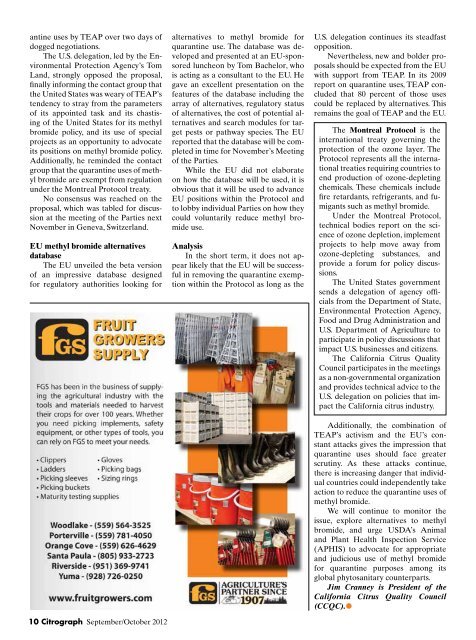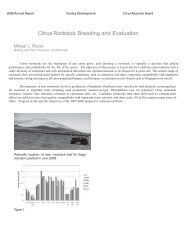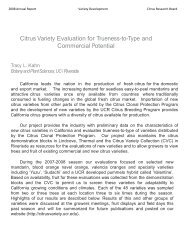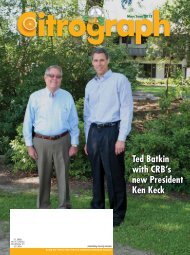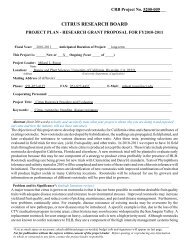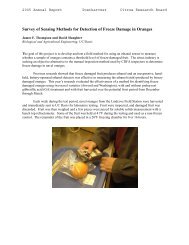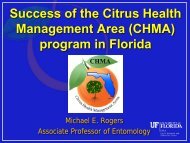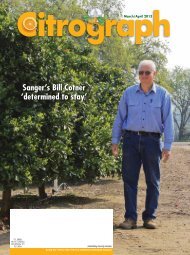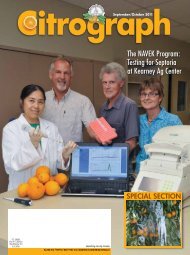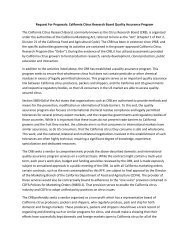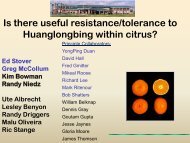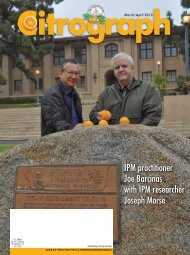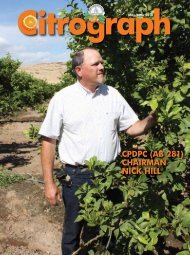Download This Issue - Citrus Research Board
Download This Issue - Citrus Research Board
Download This Issue - Citrus Research Board
Create successful ePaper yourself
Turn your PDF publications into a flip-book with our unique Google optimized e-Paper software.
antine uses by TEAP over two days of<br />
dogged negotiations.<br />
The U.S. delegation, led by the Environmental<br />
Protection Agency’s Tom<br />
Land, strongly opposed the proposal,<br />
finally informing the contact group that<br />
the United States was weary of TEAP’s<br />
tendency to stray from the parameters<br />
of its appointed task and its chastising<br />
of the United States for its methyl<br />
bromide policy, and its use of special<br />
projects as an opportunity to advocate<br />
its positions on methyl bromide policy.<br />
Additionally, he reminded the contact<br />
group that the quarantine uses of methyl<br />
bromide are exempt from regulation<br />
under the Montreal Protocol treaty.<br />
No consensus was reached on the<br />
proposal, which was tabled for discussion<br />
at the meeting of the Parties next<br />
November in Geneva, Switzerland.<br />
EU methyl bromide alternatives<br />
database<br />
The EU unveiled the beta version<br />
of an impressive database designed<br />
for regulatory authorities looking for<br />
10 Citrograph September/October 2012<br />
alternatives to methyl bromide for<br />
quarantine use. The database was developed<br />
and presented at an EU-sponsored<br />
luncheon by Tom Bachelor, who<br />
is acting as a consultant to the EU. He<br />
gave an excellent presentation on the<br />
features of the database including the<br />
array of alternatives, regulatory status<br />
of alternatives, the cost of potential alternatives<br />
and search modules for target<br />
pests or pathway species. The EU<br />
reported that the database will be completed<br />
in time for November’s Meeting<br />
of the Parties.<br />
While the EU did not elaborate<br />
on how the database will be used, it is<br />
obvious that it will be used to advance<br />
EU positions within the Protocol and<br />
to lobby individual Parties on how they<br />
could voluntarily reduce methyl bromide<br />
use.<br />
Analysis<br />
In the short term, it does not appear<br />
likely that the EU will be successful<br />
in removing the quarantine exemption<br />
within the Protocol as long as the<br />
U.S. delegation continues its steadfast<br />
opposition.<br />
Nevertheless, new and bolder proposals<br />
should be expected from the EU<br />
with support from TEAP. In its 2009<br />
report on quarantine uses, TEAP concluded<br />
that 80 percent of those uses<br />
could be replaced by alternatives. <strong>This</strong><br />
remains the goal of TEAP and the EU.<br />
The Montreal Protocol is the<br />
international treaty governing the<br />
protection of the ozone layer. The<br />
Protocol represents all the international<br />
treaties requiring countries to<br />
end production of ozone-depleting<br />
chemicals. These chemicals include<br />
fire retardants, refrigerants, and fumigants<br />
such as methyl bromide.<br />
Under the Montreal Protocol,<br />
technical bodies report on the science<br />
of ozone depletion, implement<br />
projects to help move away from<br />
ozone-depleting substances, and<br />
provide a forum for policy discussions.<br />
The United States government<br />
sends a delegation of agency officials<br />
from the Department of State,<br />
Environmental Protection Agency,<br />
Food and Drug Administration and<br />
U.S. Department of Agriculture to<br />
participate in policy discussions that<br />
impact U.S. businesses and citizens.<br />
The California <strong>Citrus</strong> Quality<br />
Council participates in the meetings<br />
as a non-governmental organization<br />
and provides technical advice to the<br />
U.S. delegation on policies that impact<br />
the California citrus industry.<br />
Additionally, the combination of<br />
TEAP’s activism and the EU’s constant<br />
attacks gives the impression that<br />
quarantine uses should face greater<br />
scrutiny. As these attacks continue,<br />
there is increasing danger that individual<br />
countries could independently take<br />
action to reduce the quarantine uses of<br />
methyl bromide.<br />
We will continue to monitor the<br />
issue, explore alternatives to methyl<br />
bromide, and urge USDA’s Animal<br />
and Plant Health Inspection Service<br />
(APHIS) to advocate for appropriate<br />
and judicious use of methyl bromide<br />
for quarantine purposes among its<br />
global phytosanitary counterparts.<br />
Jim Cranney is President of the<br />
California <strong>Citrus</strong> Quality Council<br />
(CCQC).l


